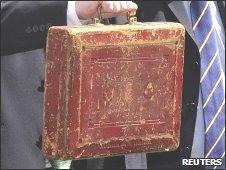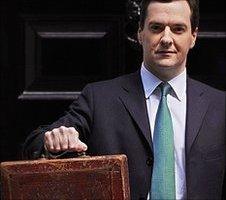Budget: UK faces worst cuts since World War II says IFS
- Published

Few UK politicians have faced such ravaged economies, the IFS says
The UK faces the "longest, deepest, sustained period of cuts to public services spending at least since World War II", said an economic think tank.
It is the first time that six years of consecutive spending cuts will have been endured, the respected Institute for Fiscal Studies (IFS) said.
Some government departments may see budgets slashed by a third, it added.
The IFS also said government claims that the rich would "feel more pain" than the poor were "debatable".
'Regressive'
"The Budget looks less progressive - indeed somewhat regressive - when you take out the effect of measures that were inherited from the previous government and when you look further into the future than 2013," said IFS director Robert Chote.
The institute noted that Labour had already identified 70% of the needed fiscal consolidation by 2016, before Mr Osborne took over at the Treasury.
Of particular concern to the IFS were the planned cuts in public services, which Mr Chote predicted would "more than reverse the entire increase that we saw under Labour".
"[The cuts] are likely to hit poorer households significantly harder than richer households," he explained.
The IFS noted that the impact on the poorest families of welfare reforms - notably the decision to index benefits to the lower Consumer Prices Index (CPI) measure of inflation - would become worse with each passing year.
Mr Chote dismissed the bulk of the government's planned welfare cuts as "a mixed bag of reforms with no consistent objective beyond the desire to save money".
'Not good news'
BBC economics editor Stephanie Flanders said the government was likely to be "embarrassed" by another IFS conclusion, that the changes in benefits announced in the Budget would significantly raise the number of households and individuals in the UK facing very high marginal tax rates on their earnings.
"That was always inevitable, given that the Treasury was trying to save money by targeting benefits and tax credits more closely on lower income households," she said.
"That necessarily means taking money away more rapidly as earned income goes up, meaning very high effective tax rates on that income.
"But it is not good news for Iain Duncan Smith and also many senior Liberal Democrats, who before the election made much of the fact that the poorest people in society can face the highest tax rates... there are going to be a lot more of them."
There was one positive message for the coalition however.
Mr Chote said: "The new government is certainly to be congratulated on the transparency with which it has presented [its policies]."
'Expensive protection'
In setting out cuts of public spending, the government has said it would protect the NHS and the Overseas Development Agency.
The effect of this, plus only limited cutbacks at Defence and Education, could leave unprotected departments such as the Home Office and Environment with having their budgets cut by as much as a third, the IFS said.
Mr Chote questioned the decision to protect the NHS, saying that it was "striking" the extent to which this would intensify the spending squeeze for other departments.
Without this protection, the average budget cuts for other departments would have been 14% instead of 25%, the IFS calculated.
Our economics editor described this as a "very expensive bit of protection".
"As the scale of the cuts becomes clear, I wonder whether the NHS will be put back on the table as well," she said.

Mr Osborne says he has taken decisive action
Earlier, Mr Osborne said his "toughest Budget package of spending cuts and tax increases in a generation" meant the UK could "look to a brighter future".
The chancellor said "decisive action" to raise VAT and cut spending would boost confidence in the economy.
Labour's Alistair Darling, the former chancellor, said it could be "dire for many" and the coalition might be unable to implement it.
Complexity
The IFS gave a detailed appraisal of the individual policies contained in the budget.
The think tank gave a thumbs-up to the planned limits to tax relief on pension contributions for high earners, which would reduce their complexity.
"The coalition now has a better approach than was in any of the three main party manifestos," said the IFS director.
However, he described the decision to water down the planned rise in capital gains tax a "missed opportunity", although the tax rise was "a step in the right direction".
On business taxes, the institute said it saw "little sign (yet) of long-term thinking", although Mr Chote welcomed the cut in the headline corporate tax rate.
He also criticised the decision to raise the VAT rate, rather than reduce the number of items that are exempt from VAT, saying this would increase price distortions.
And the director described the tax break on national insurance for start-up companies as "complicated, potentially prone to avoidance and oddly targeted".
* "Britain's economy - Cameron & Clegg Face the Audience" on tonight's Six and Ten O'Clock news or the whole half hour at 7pm on the BBC News Channel or 11.25pm on BBC2.